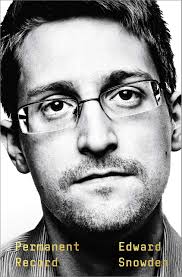Jacob Silverman at The Baffler:
 A series of discoveries, each disturbing in turn, leads to Snowden’s eventual decision to stockpile documents, smuggle them out of the Hawaiian bunker where he works for the NSA, and flee with them to Hong Kong, where he would meet the documentary filmmaker Laura Poitras and journalists Glenn Greenwald and Ewen MacAskill. One such discovery was that of Stellar Wind, a bulk surveillance program that previous NSA whistleblowers had tried to warn lawmakers about. Through these and other programs, through the building of an unprecedentedly massive data center in Utah, through the boasts of a CIA technologist who talks about collecting and computing on all information generated in the world, Snowden begins to understand that “surveillance wasn’t something occasional and directed in legally justified circumstances, but a constant and indiscriminate presence . . . a memory that is sleepless and permanent.” The machine reaches everywhere, collapsing space, time, and memory into a single archive. “I now understood that I was totally transparent to my government,” he acknowledges with the finality of someone accepting a cancer diagnosis. Even the promises of free speech become illusory under the surveillance regime, as “self-expression now required such strong self-protection as to obviate its liberties and nullify its pleasures.”
A series of discoveries, each disturbing in turn, leads to Snowden’s eventual decision to stockpile documents, smuggle them out of the Hawaiian bunker where he works for the NSA, and flee with them to Hong Kong, where he would meet the documentary filmmaker Laura Poitras and journalists Glenn Greenwald and Ewen MacAskill. One such discovery was that of Stellar Wind, a bulk surveillance program that previous NSA whistleblowers had tried to warn lawmakers about. Through these and other programs, through the building of an unprecedentedly massive data center in Utah, through the boasts of a CIA technologist who talks about collecting and computing on all information generated in the world, Snowden begins to understand that “surveillance wasn’t something occasional and directed in legally justified circumstances, but a constant and indiscriminate presence . . . a memory that is sleepless and permanent.” The machine reaches everywhere, collapsing space, time, and memory into a single archive. “I now understood that I was totally transparent to my government,” he acknowledges with the finality of someone accepting a cancer diagnosis. Even the promises of free speech become illusory under the surveillance regime, as “self-expression now required such strong self-protection as to obviate its liberties and nullify its pleasures.”
more here.
